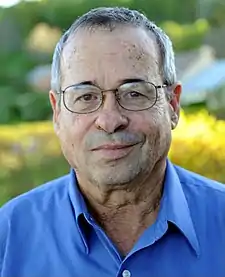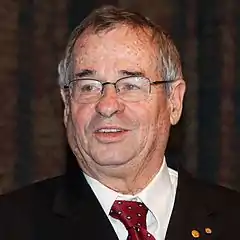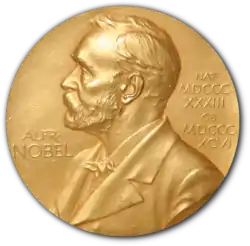Arieh Warshel
Arieh Warshel (Hebrew: אריה ורשל; born November 20, 1940) is an Israeli-American biochemist and biophysicist. He is a pioneer in computational studies on functional properties of biological molecules, Distinguished Professor of Chemistry and Biochemistry, and holds the Dana and David Dornsife Chair in Chemistry at the University of Southern California. He received the 2013 Nobel Prize in Chemistry, together with Michael Levitt and Martin Karplus for "the development of multiscale models for complex chemical systems".[1][2][3][4][5][6]
Arieh Warshel | |
|---|---|
 Warshel near Geneva, Switzerland, May 2009 | |
| Born | November 20, 1940 |
| Nationality | Israeli, American[1] |
| Alma mater | |
| Known for | Computer simulation, Computational enzymology, electrostatics, enzyme catalysis |
| Awards | Nobel Prize in Chemistry (2013)[1] |
| Scientific career | |
| Fields | Chemistry, Biochemistry, Biophysics |
| Institutions | |
| Website | laetro |

Biography
Warshel was born to a Jewish family in 1940 in kibbutz Sde Nahum, Mandatory Palestine. Warshel served in the Israeli Armored Corps. After serving the Israeli Army (final rank Captain), Warshel attended the Technion, Haifa, where he received his BSc degree in chemistry, Summa Cum Laude, in 1966. Subsequently, he earned both MSc and PhD degrees in Chemical Physics (in 1967 and 1969, respectively), with Shneior Lifson at Weizmann Institute of Science, Israel. After his PhD, he did postdoctoral work at Harvard University until 1972, and from 1972 to 1976 he returned to the Weizmann Institute and worked for the Laboratory of Molecular Biology, Cambridge, England. After being denied tenure by Weizmann Institute in 1976,[7] he joined the faculty of the Department of Chemistry at USC. He was awarded the 2013 Nobel Prize in Chemistry.
As a soldier, he fought in both the 1967 Six-Day War and the 1973 Yom Kippur War, attaining the rank of captain in the IDF.[8]
Honors
Warshel is known for his work on computational biochemistry and biophysics, in particular for pioneering computer simulations of the functions of biological systems, and for developing what is known today as Computational Enzymology.[9] He is a member of many scientific organisations, most importantly:
- Elected member of the United States National Academy of Sciences (2009)[10]
- Fellow of the Royal Society of Chemistry (2008)[11]
- Fellow of the Biophysical Society (2000)[12]
- Fellow of the American Association for the Advancement of Science (2012)[13]
- Honorary fellow of the Royal Society of Chemistry (2014)[14]
- Honorary doctorate at Bar-Ilan University (2014)[15]
- Honorary doctorate of the Faculty of Science and Technology at Uppsala University (2015)[16]
Awards
- Annual Award of the International Society of Quantum Biology and Pharmacology (1993)[17]
- Tolman Medal (2003)[18]
- President’s award for computational biology from the ISQBP (2006)[19]
- RSC Soft Matter and Biophysical Chemistry Award (2012)[9]
- Nobel Prize in Chemistry (2013) together with Martin Karplus and Michael Levitt for "the development of multiscale models for complex chemical systems".[20]
- Golden Plate Award of the American Academy of Achievement (2014)[21]
- The Founders Award of the Biophysical Society (2014)[22]
- The 2013 Israel Chemical Society Gold Medal (2014)[23]
Major research achievements
Arieh Warshel made major contributions in introducing computational methods for structure–function correlation of biological molecules, pioneering and co-pioneering programs, methods and key concepts for detailed computational studies of functional properties of biological molecules using Cartesian-based force field programs,[24][25] the combined Quantum Chemistry/Molecular mechanics (i.e., QM/MM) method for simulating enzymatic reactions,[26] the first molecular dynamics simulation of a biological process,[27][28] microscopic electrostatic models for proteins,[29] free energy perturbation in proteins[30] and other key advances. It was for the development of these methods that Warshel shared the 2013 Nobel Prize in Chemistry.
See also
References
- "The Nobel Prize in Chemistry 2013" (Press release). Royal Swedish Academy of Sciences. October 9, 2013. Retrieved October 9, 2013.
- Van Noorden, Richard (2013). "Modellers react to chemistry award: Nobel Prize proves that theorists can measure up to experimenters". Nature. 502 (7471): 280. Bibcode:2013Natur.502..280V. doi:10.1038/502280a. PMID 24132265.
- Van Noorden, R. (2013). "Computer modellers secure chemistry Nobels". Nature. doi:10.1038/nature.2013.13903. S2CID 211729791.
- Hodak, Hélène (2014). "The Nobel Prize in chemistry 2013 for the development of multiscale models of complex chemical systems: A tribute to Martin Karplus, Michael Levitt and Arieh Warshel". Journal of Molecular Biology. 426 (1): 1–3. doi:10.1016/j.jmb.2013.10.037. PMID 24184197.
- Fersht, A. R. (2013). "Profile of Martin Karplus, Michael Levitt, and Arieh Warshel, 2013 nobel laureates in chemistry". Proceedings of the National Academy of Sciences of the United States of America. 110 (49): 19656–7. Bibcode:2013PNAS..11019656F. doi:10.1073/pnas.1320569110. PMC 3856823. PMID 24277833.
- Chang, Kenneth (October 9, 2013). "3 Researchers Win Nobel Prize in Chemistry". The New York Times. Retrieved October 9, 2013.
- Nobel laureate: We left because Warshel didn't get tenure in Israel by Yitzhak Benhorin, October 9, 2013, YNET
- 3 Jewish professors — two of them Israeli — share 2013 Nobel Prize in chemistry By Gavriel Fiske, October 9, 2013, Times of Israel
- "Soft Matter and Biophysical Chemistry Award 2012 Winner". Rsc.org. Retrieved October 9, 2013.
- "Arieh Warshel Elected to the National Academy of Sciences > News > USC Dornsife". Dornsife.usc.edu. Retrieved October 9, 2013.
- "Arieh Warshel Elected to Royal Society of Chemistry > News > USC Dornsife". Dornsife.usc.edu. Retrieved October 9, 2013.
- "Fellow of the Biophysical Society Award". Biophysics.org. Archived from the original on October 6, 2013. Retrieved October 9, 2013.
- "AAAS Members Elected as Fellows". AAAS.org. November 30, 2012. Retrieved August 8, 2014.
- "Members". rsc.org. Retrieved August 8, 2014.
- "Honorary Doctorate Recipients, Bar-Ilan University". www.biu.ac.il. Retrieved September 3, 2019.
- "Three new honorary doctors in Science and Technology - Uppsala University, Sweden". www.uu.se. Retrieved February 2, 2016.
- "ISQBP People". Isqbp.umaryland.edu. Archived from the original on October 16, 2013. Retrieved October 9, 2013.
- "Tolman Award". Scalacs. September 5, 1948. Retrieved October 9, 2013.
- "Archived copy" (PDF). Archived from the original (PDF) on October 16, 2013. Retrieved October 9, 2013.CS1 maint: archived copy as title (link)
- https://www.nobelprize.org/nobel_prizes/chemistry/laureates/2013/press.pdf
- "Golden Plate Awardees of the American Academy of Achievement". www.achievement.org. American Academy of Achievement.
- "2014 Society Awardees". biophysics.org.
- "Gold Medal for Levitt and Warshel". ChemViews. January 27, 2014.
- Lifson S, Warshel A. (1968). "A Consistent Force Field for Calculation on Conformations, Vibrational Spectra and Enthalpies of Cycloalkanes and n-Alkane Molecules". J. Phys. Chem. 49 (11): 5116. doi:10.1063/1.1670007. S2CID 43907015.
- Warshel A, Lifson S. (1970). "Consistent Force Field Calculations. II. Crystal Structure, Sublimation Energies, Molecular and Lattice Vibrations, Molecular Conformations and Enthalpies of Alkanes". J. Chem. Phys. 53 (2): 582. Bibcode:1970JChPh..53..582W. doi:10.1063/1.1674031.
- Warshel A, Levitt M (1976). "Theoretical Studies of Enzymatic Reactions: Dielectric Electrostatic and Steric Stabilization of the Carbonium Ion in the Reaction of Lysozyme". J. Mol. Biol. 103 (2): 227–249. doi:10.1016/0022-2836(76)90311-9. PMID 985660.
- Warshel A. (1976). "Bicycle-pedal Model for the First Step in the Vision Process". Nature. 260 (5553): 679–683. Bibcode:1976Natur.260..679W. doi:10.1038/260679a0. PMID 1264239. S2CID 4161081.
- Warshel A. (2002). "Molecular Dynamics Simulations of Biological Reactions". Acc. Chem. Res. 35 (6): 385–395. doi:10.1021/ar010033z. PMID 12069623.
- Warshel A., Russel T. (1984). "Calculations of electrostatic interactions in biological systems and in solutions". Q. Rev. Biophys. 17 (3): 283–421. doi:10.1017/s0033583500005333. PMID 6098916.
- Warshel A (1984). "Simulating the Energetics and Dynamics of Enzymatic Reactions". Pontificiae Academiae Scientiarum Scripta Varia. 55: 60.
External links
- Faculty profile, USC Dornsife
- Warshel research group at the University of Southern California
- Arieh Warshel on Nobelprize.org

| Awards | ||
|---|---|---|
| Preceded by Brian Kobilka Robert Lefkowitz |
Nobel Prize in Chemistry laureate 2013 With: Martin Karplus Michael Levitt |
Most recent |
